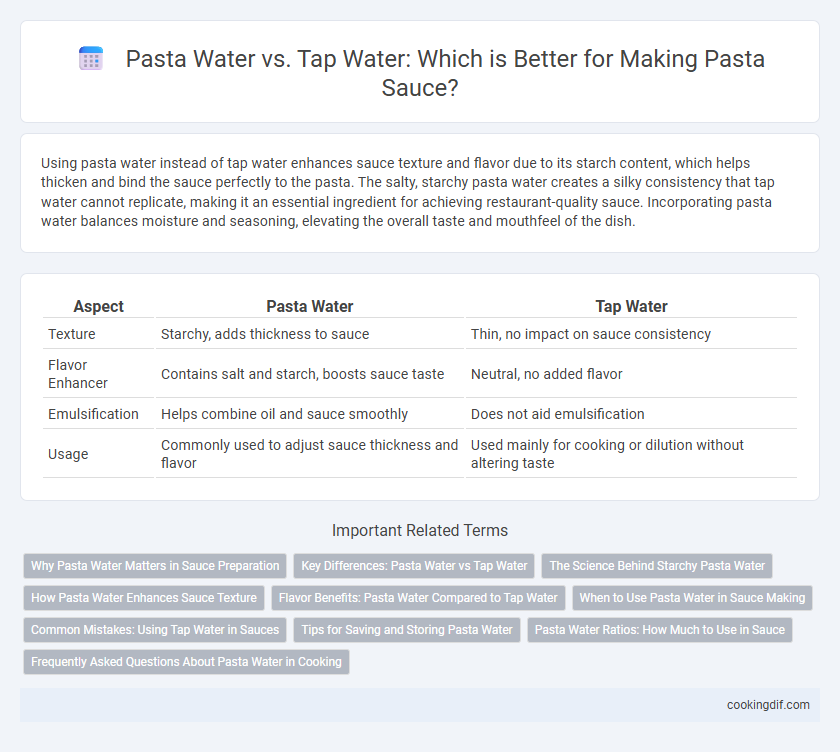Using pasta water instead of tap water enhances sauce texture and flavor due to its starch content, which helps thicken and bind the sauce perfectly to the pasta. The salty, starchy pasta water creates a silky consistency that tap water cannot replicate, making it an essential ingredient for achieving restaurant-quality sauce. Incorporating pasta water balances moisture and seasoning, elevating the overall taste and mouthfeel of the dish.
Table of Comparison
| Aspect | Pasta Water | Tap Water |
|---|---|---|
| Texture | Starchy, adds thickness to sauce | Thin, no impact on sauce consistency |
| Flavor Enhancer | Contains salt and starch, boosts sauce taste | Neutral, no added flavor |
| Emulsification | Helps combine oil and sauce smoothly | Does not aid emulsification |
| Usage | Commonly used to adjust sauce thickness and flavor | Used mainly for cooking or dilution without altering taste |
Why Pasta Water Matters in Sauce Preparation
Pasta water contains starch released during cooking, which acts as a natural thickener and binder for sauces, improving texture and helping the sauce cling to the pasta. The mineral content and slight saltiness of pasta water enhance flavor and balance the sauce's seasoning more effectively than plain tap water. Using reserved pasta water transforms thin sauces into silky, well-emulsified blends that elevate the overall dish quality.
Key Differences: Pasta Water vs Tap Water
Pasta water contains starch released from the pasta during cooking, making it a valuable ingredient for thickening and binding sauces, unlike plain tap water which lacks these properties. The starch in pasta water enhances sauce texture and helps it cling better to the pasta, creating a creamier and more cohesive dish. Tap water, while essential for cooking, does not contribute to sauce consistency or flavor development in the same way that pasta water does.
The Science Behind Starchy Pasta Water
Starchy pasta water contains soluble starches released during cooking, which act as natural emulsifiers, helping to bind oil and water-based ingredients in sauces for a smooth, creamy texture. Unlike tap water, which lacks these starches, pasta water enhances sauce consistency and adhesion by promoting a stable emulsion. This scientific interaction improves flavor integration and prevents sauces from separating or becoming watery.
How Pasta Water Enhances Sauce Texture
Pasta water contains starch released during cooking, which acts as a natural thickening agent, enhancing the sauce's texture and helping it cling better to the pasta. Unlike tap water, pasta water's unique composition improves sauce consistency, making it silkier and more cohesive. This starchy water also balances moisture, preventing the sauce from becoming too runny or dry.
Flavor Benefits: Pasta Water Compared to Tap Water
Pasta water contains starch released from the cooked pasta, which enhances sauce texture and helps it adhere better to noodles, creating a richer and more cohesive flavor profile. Unlike tap water, pasta water carries subtle seasoning and residual salt that intensifies the overall taste of the dish. Incorporating pasta water into sauces boosts umami and depth, making the final meal more flavorful and satisfying.
When to Use Pasta Water in Sauce Making
Pasta water contains starch released during cooking, which helps thicken and bind sauces, creating a smooth and velvety texture that tap water cannot provide. Use pasta water when finishing sauces like Alfredo, carbonara, or tomato-based sauces to achieve perfect consistency and enhanced flavor integration. Adding small amounts of warm pasta water gradually allows precise control over sauce thickness and improves its ability to cling to the pasta.
Common Mistakes: Using Tap Water in Sauces
Using tap water instead of pasta water in sauces often leads to a loss of flavor and poor sauce consistency because tap water lacks the starch released from cooked pasta. This common mistake results in sauces that are thinner and less cohesive, failing to properly cling to the pasta strands. Incorporating starchy pasta water enhances sauce texture and helps emulsify oils, creating a richer and more flavorful dish.
Tips for Saving and Storing Pasta Water
Pasta water contains starch that enhances sauce texture and flavor, making it an essential ingredient for perfecting pasta dishes. To save pasta water, reserve a cup before draining and store it in a sealed container in the refrigerator for up to 48 hours. Reheat gently and add gradually to sauces to maintain the ideal consistency and avoid dilution.
Pasta Water Ratios: How Much to Use in Sauce
Pasta water contains starch that helps thicken and bind sauces, making it essential for achieving the perfect texture. The ideal ratio is typically 1/4 to 1/2 cup of pasta water per serving, adjusted based on the sauce's consistency and quantity. Using this starchy water instead of tap water enhances flavor integration and creates a creamy, cohesive sauce.
Frequently Asked Questions About Pasta Water in Cooking
Pasta water contains starch released from the pasta during cooking, making it ideal for thickening and binding pasta sauces. Unlike tap water, which lacks these starches, the starchy pasta water helps create a silky, cohesive sauce that clings better to the pasta. Common questions address how much pasta water to reserve, when to add it to the sauce, and its effect on sauce texture and flavor balance.
Pasta water vs tap water for sauce Infographic

 cookingdif.com
cookingdif.com